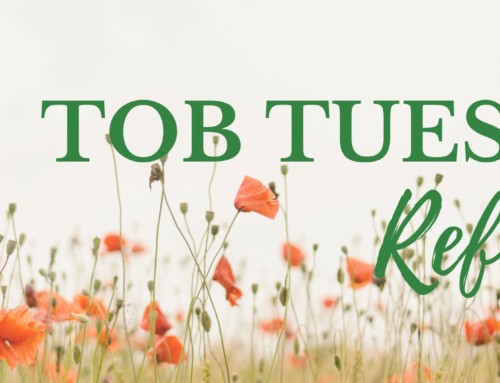This week’s TOB Tuesdays is a special edition.
Windshield Wipers, Hidden Gifts, and Coronavirus
by Katrina J. Zeno, MTS
Last week, I decided to read 1 Corinthians in my prayer time. Given our current time of spiritual and social challenges, two verses jumped out at me:
- “What do you have that you did not receive?” (1 Cor 4:7)
- “But he who is united to the Lord becomes one spirit with him.” (1 Cor 6:17)
The first Scripture was movingly echoed by an Italian doctor in an editorial entitled, “Letter from the Trenches.” Written to the editor of an Italian newspaper and published on March 18, 2020, this physician in Milan had previously been working with 650 HIV-seropositive patients but was suddenly conscripted into the fight against COVID-19 along with his colleagues. He makes a striking – and perhaps conscience-pricking – observation. Here are his own words:
I have noticed the nearly complete disappearance of complaints, and I find this to be a very important symptom. Rather than complain, my patients send me messages every day to ask me how I am doing, wanting to participate in the incredible and exceptional experience I am living. This is the very reason I have decided to write to you [to the editor].
In fact, what I am living—but I believe this to be an experience shared by many others—is a phenomenon that we physicians often see in those who have survived a brush with death: the experience of opening your eyes and realizing that nothing can any longer be taken for granted. It is the recognition that everything is a gift: waking up in the morning, greeting your loved ones, and even all the little moments of daily life, that for some are merely time to be filled, but for others, like me, have unexpectedly become even more compelling than before. [underline added]
The grace of this new self-awareness radically transforms what we do, generating amazement, friendship. We look at each other and say: today we cannot hug each other, but a smile says much more than what a hug used to say.
In the midst of pouring himself out as gift, this Italian doctor vividly experienced 1 Corinthians 4:7 – What do we have that we have not received as gift? In an affluent culture where so many things are consistently at our fingertips, it’s easy to forget that even life itself is a gift. I’m sure you have encountered, as I have, many people unexpectedly discovering “hidden gifts” when the temptation to complain seems so justified.
I’m sure you have encountered, as I have, many people unexpectedly discovering “hidden gifts” when the temptation to complain seems so justified.
In fact, I just got off the phone with a young man whose marriage is scheduled for early May. The wedding will go forward, but without a reception or honeymoon. When I mentioned it must be hard to not be disappointed, his response surprised me. He said the changed situation is providing the opportunity to focus on the Sacrament of Marriage in a different way. The forced slowdown of quarantine has given him and his fiancée the opportunity to spend more time together in the marriage prep process. In addition, and he used this language without me even prompting him, he said the unexpected gift is that they will be able to use the money from the reception and honeymoon as a down payment for a house.
Wow, what a young man of faith! He had every reason to complain, and yet he chooses to focus on the emerging beauty of the Sacrament and the long-term fruit of establishing their domestic church in their own home as the result of sacrifices they would never have chosen but have graciously accepted.
St. John Paul II was no stranger to forced change under both Nazism and Communism. As Archbishop of Krakow, he gave a Holy Week retreat to university students in 1962. In this retreat, he invited the participants to read the Gospels in depth to see how Christ opens himself up and speaks to us in a direct and personal way. The future Pope John Paul II observed how this kind of self-opening “between one person and another we should call…grace, or, better still, a gift.”
Isn’t this precisely what the young couple preparing for marriage is experiencing – the gift, the grace, of opening themselves to each other in a more vulnerable, direct, and undistracted way? Oh, that we could imitate them as they are imitating Christ!
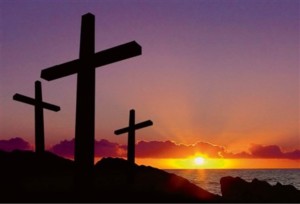 In this retreat, St. John Paul II goes on to say, God “wants to draw [you] into his love and enfold [you] in himself – and he is love itself. He wants to give himself to [you]. This is very wonderful.”
In this retreat, St. John Paul II goes on to say, God “wants to draw [you] into his love and enfold [you] in himself – and he is love itself. He wants to give himself to [you]. This is very wonderful.”
God wants to give himself to you in a new way as we walk through Holy Week: At the Last Supper, Jesus wants to wash your feet in an act of extreme humility and service (God washing your feet!). On the cross, He wants to hide you in His pierced side, close to His Sacred Heart, so that He suffers with you. Christ is dying with you as you die to your wedding plans, to your desire for baptism or the Eucharist at the Easter vigil, to your now-cancelled vacation, to your anger at a loved one dying alone. And He is rising as you and your loved ones rise to a new spirit of gratitude, to discovering hidden gifts in the unforeseen changes, to an Easter stripped of its trimmings and trappings so as to display the empty, Victorious tomb.
He is rising as you and your loved ones rise to a new spirit of gratitude, to discovering hidden gifts in the unforeseen changes, to an Easter stripped of its trimmings and trappings so as to display the empty, Victorious tomb.
In this same retreat, St. John Paul II also invited the participants to experience “an encounter with Christ who lives, speaks, acts, suffers, dies and rises again” through the Gospels. Again, what a timely description of Holy Week when we read the Passion accounts on Palm Sunday and Good Friday as participants, not as passive observers. We are journeying with Christ who lives, speaks, acts, suffers, dies, and rises again this week. For some people, this will literally be the last week of their earthly life, but it will not be the end of their life.
In the rite for a Catholic funeral mass, one of the most striking statements is prayed toward the end of the celebration: “Lord, for your faithful people life is changed, not ended. When the body of our earthly dwelling lies in death, we gain an everlasting dwelling place in heaven.”
I can’t help but think how we’ve been exploring heaven and our eternal dwelling place in the last three blogs. Our eternal happiness is not characterized by pearly gates, clouds, harps, or a long nap resting in peace. Death ushers us into our Heavenly Homecoming par excellence! In passing through the veil from time into eternity, our loved ones experience the Trinity’s total gift of self in love through Christ’s glorified body. Eternal Life is the sweetness of resting in the Father’s embrace and against Christ’s breast like the Beloved Disciple in the glorious love-bond of the Holy Spirit without interruption.
Which brings me to the second Scripture that captured my attention this past week – St. Paul’s unqualified statement that we are one spirit with Christ.
I’m sometimes surprised and re-inspired by notes I crammed in my Bible’s margin from previous times of reading the same passage. Just beside 1 Cor 6:17, I wrote one word: constant. Being one spirit with Christ is different than one-flesh Sacramental union with Christ through the Eucharist. Our Eucharistic union with Christ is intermittent; it starts and stops. However, from the moment of our baptism, our spiritual union with Christ can be constant and uninterrupted if not broken by mortal sin. This should give us great consolation as we find ways to increase our spiritual union with Christ during our Eucharistic Abstinence (see Blog 15.5 on “Eucharistic Abstinence and NFP”).
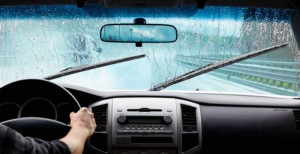 The image I like to use to distinguish between these two ways of union with Christ is that of windshield wipers. When using the intermittent setting on our wipers, say for a light drizzle, the wipers swing across the windshield and back, and then stop. A few seconds later, they wipe again, and then stop. This reminds me of our Eucharistic communion: for a few precious moments, we are in intimate union and Holy Communion with Christ, and then it stops.
The image I like to use to distinguish between these two ways of union with Christ is that of windshield wipers. When using the intermittent setting on our wipers, say for a light drizzle, the wipers swing across the windshield and back, and then stop. A few seconds later, they wipe again, and then stop. This reminds me of our Eucharistic communion: for a few precious moments, we are in intimate union and Holy Communion with Christ, and then it stops.
In contrast, when we drive through heavy rain, we put our wipers on high and the back-and-forth motion is constant. This describes our spiritual union with Christ – it doesn’t stop and start but remains constant. Through our spirit-to-Spirit union, we remain in constant contact with our Savior, Lord, Friend, and Spouse, Jesus Christ through the love-bond of the Holy Spirit.
Through our spirit-to-Spirit union, we remain in constant contact with our Savior, Lord, Friend, and Spouse, Jesus Christ through the love-bond of the Holy Spirit.
It’s this kind of constant, spiritual-union contact that living in gratitude is inviting us to rediscover during our quarantine. It can help shift our focus from the uncertainty and anxiety occurring on the outside to the gracious current of spiritual communion flowing through us on the inside. Two weeks ago, my roommate and I took the challenge of daily gratitude to heart – we began sharing at dinnertime or before bed, three things from that day we are grateful for. Some days, this new habit has been a life-saver as it’s forced me to take the negative aspect of my day and reframe it to find the hidden gift within it.
 During this holiest of weeks (and beyond), perhaps you could establish this new habit of “3 things I’m grateful for today” with your family or household or make this commitment with a friend and share daily over the phone. In addition, I encourage you to smile, smile, smile at everyone you see (even within your domestic church) along with walking this Holy Week as if it were your last. Christ desires to encounter you as He lives, speaks, acts, suffers, dies, and rises again through the Living Word of God. May you receive anew the firm conviction that for those in constant, spiritual union with Christ, life is changed, not ended at death – nor during the Coronavirus pandemic. This is very wonderful.
During this holiest of weeks (and beyond), perhaps you could establish this new habit of “3 things I’m grateful for today” with your family or household or make this commitment with a friend and share daily over the phone. In addition, I encourage you to smile, smile, smile at everyone you see (even within your domestic church) along with walking this Holy Week as if it were your last. Christ desires to encounter you as He lives, speaks, acts, suffers, dies, and rises again through the Living Word of God. May you receive anew the firm conviction that for those in constant, spiritual union with Christ, life is changed, not ended at death – nor during the Coronavirus pandemic. This is very wonderful.
Link to “Letter from the Trenches”: https://thehumanadventure.wixsite.com/mysite-1/post/letter-from-the-trenches
Quotes from St. JP2 can be found in his book, “The Way to Christ: Spiritual Exercises,” p. 16.
(Please “share” this blog – and invite your friends to like the JPII Resource Center FB page. Thank you.)
© by Katrina J. Zeno, MTS
Jack Henz’ Reflection: Unforeseen Changes – Hidden Gifts
Katrina’s blog this week said smile, smile, and more smiles. For the past two weeks, the people I saw during my daily 5-mile walk were not eager to engage. Most kept their heads pointed to the ground, never acknowledging my presence. Some folks quickly moved to be 10-15 feet away or even walked across the street to avoid contact. They were scared of getting the Coronavirus.
Then, mid-week as the press warned the worst was yet to come, something happened. People started re-engaging.
They returned smiles, perhaps acknowledging “we’re all in it together.” They adhered to proper physical distancing but said, “Hi.” Were they missing human contact? Did they need something “more” in their lives? Suddenly, small “hidden gifts” were beginning to be realized and recognized where least expected, including within my own family.
Suddenly, small “hidden gifts” were beginning to be realized and recognized where least expected, including within my own family.
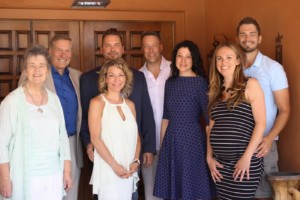 My family members live in Chapel Hill, North Carolina; Denver, Colorado; and the Phoenix metro area. We shared a Zoom meeting recently to re-connect as a family. Let me share how my family is uncovering each other’s hidden gifts due to the life-style change we are all experiencing.
My family members live in Chapel Hill, North Carolina; Denver, Colorado; and the Phoenix metro area. We shared a Zoom meeting recently to re-connect as a family. Let me share how my family is uncovering each other’s hidden gifts due to the life-style change we are all experiencing.
The call was set up by my son, Jon, in North Carolina. He and his wife are both able to work their jobs from home. They have gained 8-12 hours a week of family time, which was usually spent on commuting and evening meetings. The “gift” of extra time together has led to a strengthening and enriching of their marriage. Shared prayer time, televised Masses, and video-study programs now fill their time. God is coming deeper into their lives and they are welcoming Him. Hidden Gift 1: God’s deepening presence.
In snowy Denver, my son Thomas, a wood-work craftsman, has voluntarily stepped away from home-improvement work due to COVID-19 concerns. While he has funding set aside for an upcoming home down payment, the loss of income and uncertainty are taking a toll. “Fortunately,” his wife is a nurse working in a hospital ICU unit with steady employment. She has fears of contracting the virus at work. They are praying the rosary daily for answers to their prayers. They are trusting in God’s will and have complete faith in God’s plan for them. Hidden Gift 2: Through the rosary they are communicating with Jesus and Mary daily.
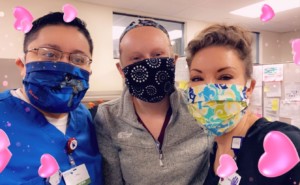 Here in Phoenix, my son Dan and his wife are both working their jobs from home. While they miss the comradery of fellow workers, they are equally excited over having more time with their almost two-year-old son. They have taught him the alphabet, colors, drawing, and sentences over the past three weeks. Their professional jobs negated much of the personal time they are now devoting to their son and each other. They are attending televised Mass. Hidden Gift 3: Their domestic church is thriving and, hopefully, growing.
Here in Phoenix, my son Dan and his wife are both working their jobs from home. While they miss the comradery of fellow workers, they are equally excited over having more time with their almost two-year-old son. They have taught him the alphabet, colors, drawing, and sentences over the past three weeks. Their professional jobs negated much of the personal time they are now devoting to their son and each other. They are attending televised Mass. Hidden Gift 3: Their domestic church is thriving and, hopefully, growing.
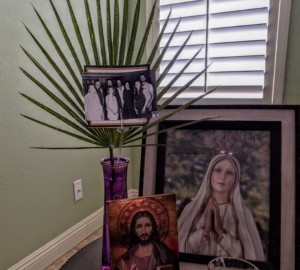 Jon, Dan, and I discussed ways we could financially assist Thomas in Denver or any other extended family members in need. We discussed how we all felt “gifted by God” to help others. Hidden Gift 4: Family solidarity in need and faith.
Jon, Dan, and I discussed ways we could financially assist Thomas in Denver or any other extended family members in need. We discussed how we all felt “gifted by God” to help others. Hidden Gift 4: Family solidarity in need and faith.
As a Dad, I was excited to see my sons’ families weathering the COVID-19 storm and working together to help each other and their Mom and Dad out. What excited me more was to see them adjusting their priorities to bring God more into their lives through prayer, rosaries, televised Masses, and religious study. Hidden Gift 5: Extra, extra thanksgiving to God from me, a “gifted” father.
©by Jack Henz
We invite you to share your own 2-3 line reflection on our JPII Resource Center Facebook page by clicking here.
*Jack Henz is a retired meteorologist and a graduate of the Diocese of Phoenix ‘s Kino Catechetical Institute. Together with his wife Karen, he is a passionate catechist concerning all things Catholic, especially the Theology of the Body.



